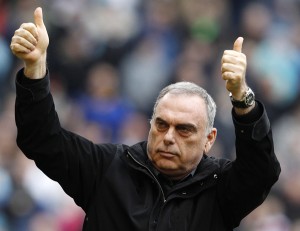If Avram Grant is the answer, you know the question is not going to be straightforward. His apologists may argue that the reputation acquired by the 59-year-old during his time at Chelsea, Portsmouth and West Ham United is unfair, but it is also true to say that Ghana would never have turned to him for their Africa Cup of Nations campaign if the situation had not been desperate.
Ghana, frankly, need the help after a hugely disappointing 2014. They played extremely well in patches at the World Cup, but were undone by a late winner from the USA and a Miroslav Klose equaliser when they had Germany on the ropes, and their tournament ended up being dominated by an unseemly row over bonuses.
However justified the players may have been in their complaints, the wild celebrations when the cash was airlifted in played badly in a country undergoing severe economic crisis.
That placed Kwesi Appiah's job in jeopardy, having been teetering since a lethargic performance at the 2013 Cup of Nations when Ghana, for the second time running reached the semi-finals without ever looking convincing.
The Ghanaian football federation took the baffling decision to send Appiah on coaching courses, none of which did anything to tackle the structural problems that are a far bigger issue than Appiah's abilities.
Appiah clung on until the end of qualifying but it was a far from impressive campaign that featured two games against Uganda in which they failed to score from open play, taking a single point.
Appiah's exit was a surprise only in that it was delayed so long; more of a shock was that the man chosen as his replacement was Grant.
After leaving West Ham following their relegation in 2011, he took charge of Partizan Belgrade in January 2012 and led them to a fifth successive Serbian championship, although their lead was cut and the feeling was that they played far worse in his four months in charge than in the first half of the season.
Since then, his only job in football has been as technical director of the Thai club BEC Tero Sesana, a team founded by Worawi Makudi, the Fifa Exco member who was accused of corruption by Lord Triesmann in 2011. The popularity of Chelsea in Ghana, though - thanks to Michael Essien's years at the club - means Grant enjoys a relatively high profile in the country.
"I am very happy that we have a very good coach," Christian Atsu, the Chelsea winger on loan at Everton, said. "He has a very high profile, we know he was in Chelsea and he can help the team to move forward.
"We had great coaches who applied for the job and when you hear the news in Ghana, a lot of the fans prefer Avram Grant because of his profile, because of his experience and because of how far he has gone in football. The fans love him and they are looking for him to build the team not just to win the African Cup but to build a team and then in the future we can win something for Ghana. I think he's the right man.
"For 32 years now, we haven't won the African Cup and the fans are really angry with the players. So I think we also needed a good coach to lead us and I think Avram Grant will be the man to lead the Black Stars to victory."
Without the injured Kwadwo Asamoah, who plays at wing-back for Juventus but as a central playmaker for his country, Grant has been left short of creativity, something to which he has responded by adopting a 3-5-2, moving Marseille's Andre Ayew into the centre.
The son of the former Ghana great Abedi Pele, Ayew is a prodigiously talented player who was almost single-handedly responsible for Ghana's quarter-final win against Tunisia in the 2012 tournament.
At the moment, Grant has the popularity to face down one of his stars, but his reign has not been without questions. The selection of the 24-year-old forward Kwesi Appiah (no relation to his namesake, the former coach), who is on loan at Cambridge United from Crystal Palace, has caused some consternation. He has scored eight goals in 23 games this season, but many in Ghana have asked why he has been selected over domestic based players.
Recently behind-closed-doors friendlies have reportedly gone well, although a game against Freiburg was cancelled for fear of further injuries after the former Sunderland centre-forward Asamoah Gyan sustained a knock. Gyan, now playing for Al Ain in Abu Dhabi - and scoring over a goal a game - should be fit to start against Senegal this afternoon.
"He is a new coach," Gyan said, "and all we need is the support from the people of Ghana to push Ghana to the highest level because he's one of the best coaches in the world, he's got a good CV, he's a good man also. What we have to do is to just give him the support and on behalf of the players, we would like to welcome him into our camp and abide by his tactics that he brings on board and do it well."
Having been drawn in what is by far the harder half of the draw, with South Africa and Algeria to come in the group and then, if they get through, probably Ivory Coast or Cameroon in the quarter-final, progress would be difficult even without all Ghana's problems.
Reaching the semi-final this time would be a far greater achievement than in either of the last two tournaments.

